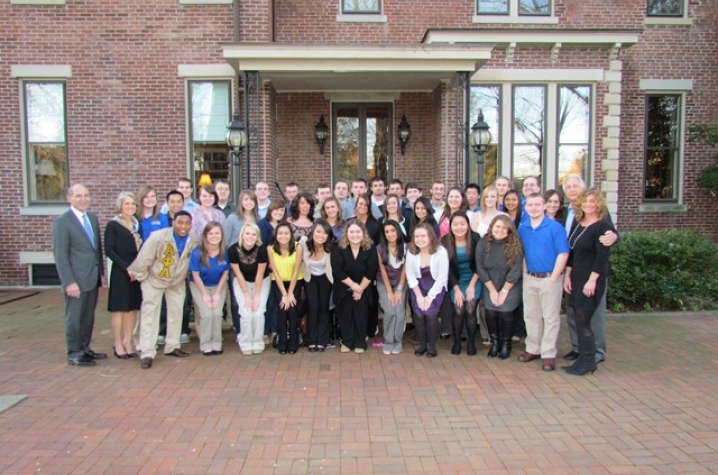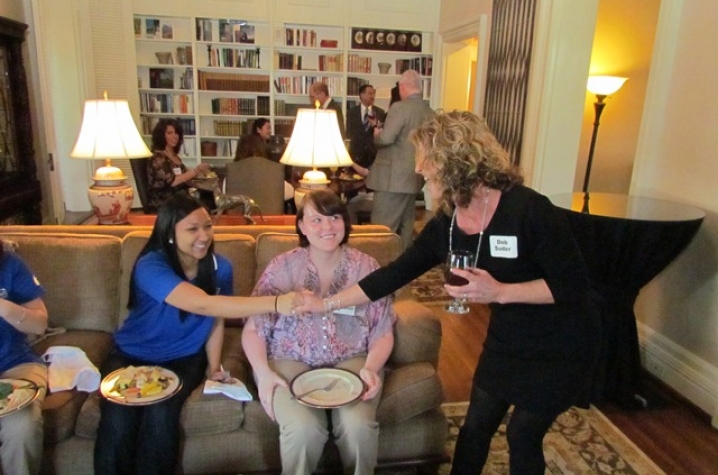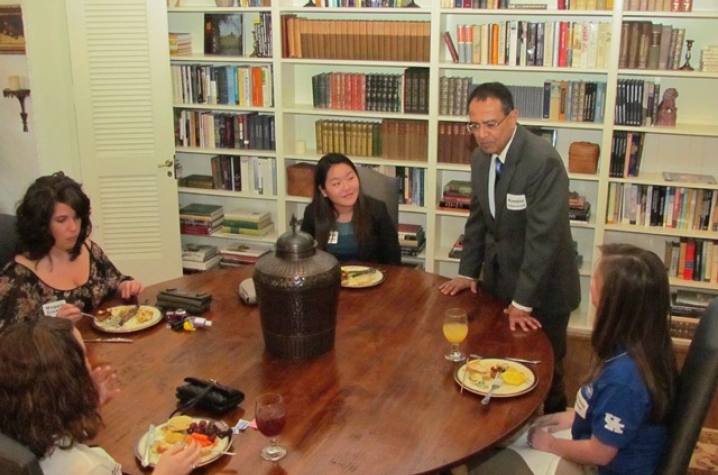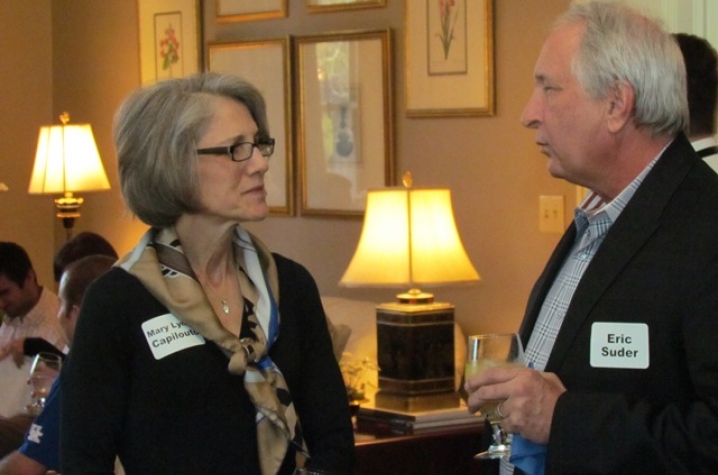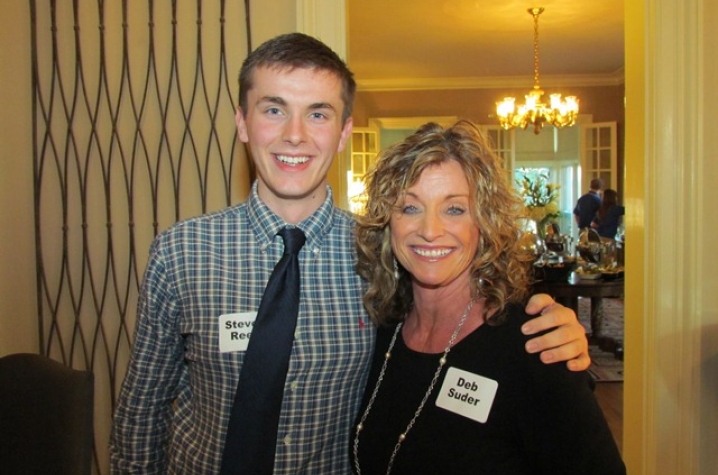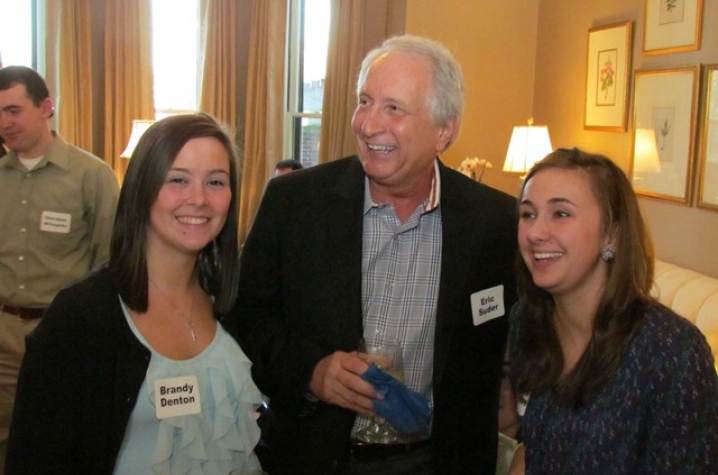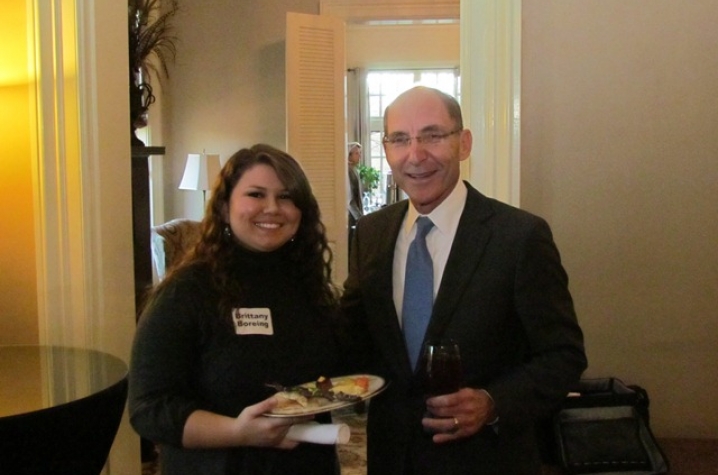UK First Scholars Meet with Benefactors, Eric and Deb Suder
LEXINGTON, Ky. (Feb. 9, 2012) — As a first-generation college student, one experiences a lot of firsts — first time away from home, first time living in a residence hall, first time without a curfew — but UK's First Scholars got to add something to their lists rarely experienced by other scholarship recipients; they were able to meet first-hand the benefactors who made their college education possible.
President Eli and Dr. Mary Lynne Capilouto hosted a reception for the UK First Scholars and their benefactors, Eric and Deb Suder, at Maxwell Place on Thursday, Feb. 2. The event provided an opportunity for the students to converse with the Suders, as well as share their experiences in the program with President Capilouto and Provost Kumble Subbaswamy.
Eric Suder is the founder of The Suder Foundation, a private organization based out of Plano, Texas. The foundation's First Scholars program provides a data-driven approach to selected four-year universities aimed at increasing the graduation rate of first-generation students.
The Suders began the First Scholars program as a grant process, receiving written applications from approximately 40 schools. When UK became a finalist, The Suder Foundation conducted a series of conference calls before selecting UK as one of two sites for the pilot program in 2009 and providing a $1.1 million grant to launch the program.
"Over the process of the grant, the conference calls and choosing our first beta site for our first classes, it was really obvious that UK was a perfect match," said Deb Suder. "The passion, the spirit and the already huge commitment that UK has to first-generation kids and the various demographics in the state were clear. We are so thrilled that it turned out that we were brought together. And we really felt like it was meant to be."
The Suders were able to directly interact with the First Scholar students at the reception.
"I expected (the reception) to be us coming here and sitting down, and them talking to us as a group," said First Scholar Steven Reed. "But it's more of actually getting to know them. Deb makes a point to get to know us on a personal level. I even call her by her first name. She likes to come around and see us, to see how the numbers in the conference room are actually correlating with how we're doing."
These numbers further validate the success of the program. The UK First Scholars program boasts a 95 percent retention rate, compared to a 74 percent retention rate among first-generation students at UK who are not in a program for first generation college students.
"The program has really been successful because of the campus attitude here," Eric Suder said. "Matthew Deffendall [director of the University of Kentucky's First Generation Initiative] is a natural and has gotten everyone enthusiastic about making things work. So, we chose this university, not because we had some tie to the school, but because we knew it was a good school that would get the job done for us."
The Suders now have First Scholars programs at four other schools: The University of Alabama, Southern Illinois University Carbondale, The University of Memphis and Washington State University. They continue to promote their program and emphasize the importance of a unique approach to supporting first-generation students.
"It seems to me a shame that somebody can't get a college education if they are smart enough to go to college," Eric Suder said. "There's economics that keep you from that and other reasons — your family environment, or you just don’t have the opportunity. And worse than that is if you somehow can, as a first-generation student, get enough money, break away from whatever you need to break away from, get accepted, get to school, and then flunk out or leave, not because you're not bright enough, but because you're not well enough equipped. You don't have a support system, you have a lot of things working against you that you don't even understand. And that seems even worse than someone who has the ability and comes and plays around and flunks out. If you work your heart out, and for some reason you still can't get any traction — that to me is the worst thing. So that is what this program is trying to change."
The program provides holistic academic support, campus involvement activities and peer mentoring. Peer mentors like senior Cody Griggs are also first-generation students who assist the incoming scholars with the adjustment.
"Each mentor is assigned four mentees: two sophomores and two freshmen," Griggs said. "And we meet up with them each week, and it can be informal; we just spend time with each other and find out some things they need help with."
The Suders, Matthew Deffendall and Program Coordinator Martina Martin are optimistic that the program will continue to benefit first-generation students at UK.
"It's just so amazing to see these kids and to see that it really works," Deb Suder said. "And to see how much they’ve matured and are already blossoming and are so confident. The sophomores are taking the freshmen under their wings, which is such an important part of what we dreamed and envisioned of how it would work. It just thrilled me; I really don't have the words to express how thrilled we are."
Applications for the next class of UK First Scholars are currently being accepted. The deadline for submission is Feb. 15, 2012.
MEDIA CONTACT: Sarah Geegan, (859) 257-5365; sarah.geegan@uky.edu





